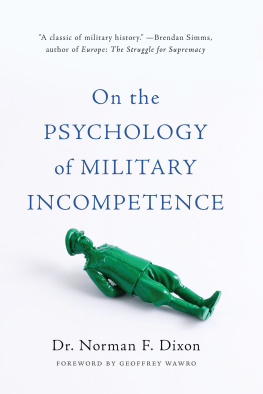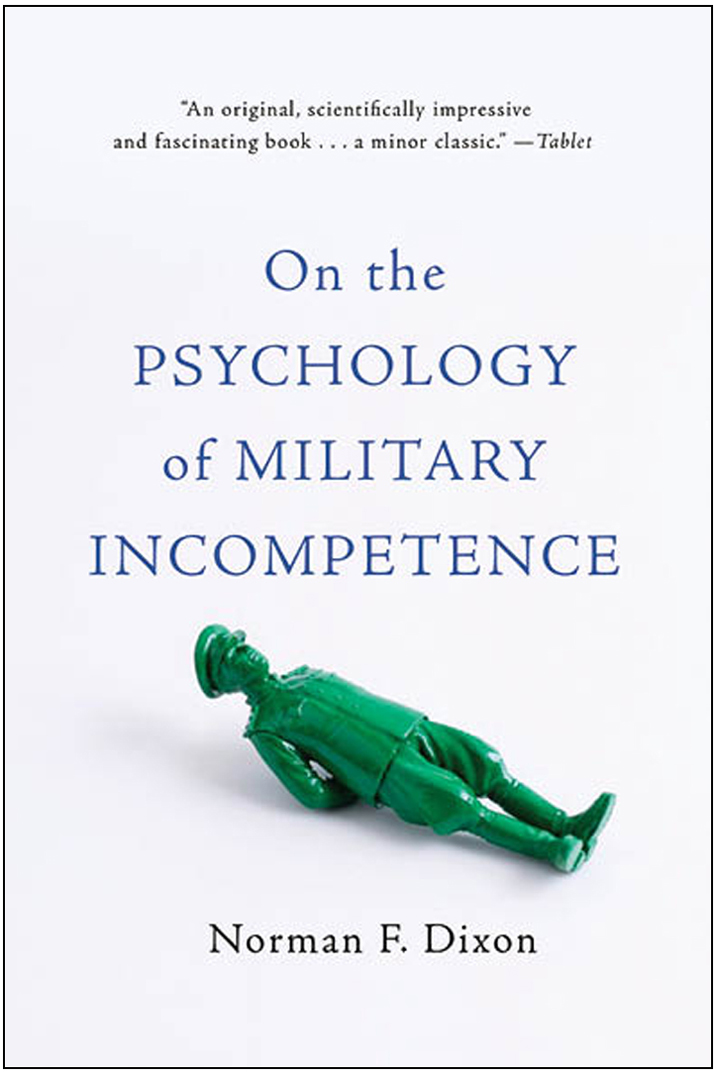
ALSO BY NORMAN F. DIXON
Preconscious Processing
Subliminal Perception: The Nature of a Controversy

Copyright 1976 by Norman F. Dixon
Hardcover first published in 1976 by Basic Books,
A Member of the Perseus Books Group
Foreword to the 2016 edition copyright by Geoffrey Wawro
First published by Jonathan Cape Ltd 1976
Pimlico, an imprint of Random House, edition 1994
Current edition published in 2016 by Basic Books
All rights reserved. Printed in the United States of America. No part of this book may be reproduced in any manner whatsoever without written permission except in the case of brief quotations embodied in critical articles and reviews. For information, contact Basic Books, 250 West 57th Street, New York, NY 10107.
Books published by Basic Books are available at special discounts for bulk purchases in the United States by corporations, institutions, and other organizations. For more information, please contact the Special Markets Department at the Perseus Books Group, 2300 Chestnut Street, Suite 200, Philadelphia, PA 19103, or call (800) 810-4145, ext. 5000, or e-mail .
A CIP catalog record for this book is available from the Library of Congress.
ISBN: 978-0-465-09781-4 (2016 e-book)
LCCN: 76009336 (original edition)
10 9 8 7 6 5 4 3 2 1
To Christine, Camilla and Rachel
Competence, then, is the free exercise of dexterity and intelligence in the completion of tasks, unimpaired by infantile inferiority.
E. H. Erikson, Youth, Change and Challenge
With 2,000 years of examples behind us we have no excuse when fighting, for not fighting well.
T. E. Lawrence, letter, in Liddell Hart, Memoirs
No general ever won a war whose conscience troubled him or who did not want to beat his enemy too much.
Brigadier Shelford Bidwell, Modern Warfare
Table of Contents
Guide
Contents
by Geoffrey Wawro
On the Psychology of Military Incompetence
BY GEOFFREY WAWRO
Norman Dixons On the Psychology of Military Incompetence is a classic that should be read not because it is true in every detail but because it offers the military historian, analyst, or student an important method to discover and rank the manifold reasons for military error and defeat.
Dixon deploys psychological theory in a lucid, accessible way and applies it in several case studies spanning the nineteenth and twentieth centuries. He is, in some ways, constrained by chronology. The British officer types he scrutinizes are creatures of their age: boorish, conservative, and authoritarian. They went to stuffy boarding schools and endured tyrannical parents and schoolteachers. They enlisted in a class system that expected snobbish conformity. And yet the deeper you read into this book, the more you realize that the specific circumstances of a Raglan, Haig, or Montgomery are less important than their lifelong enlistment in a military hierarchy that constrains and often warps behavior.
At the heart of this book is a thesis that all can accept. All human decision makers are victims of a chronic hazard: that emotion and motivation unconsciously distort and bias all thought and perception. Mans needsbiological, social, or neuroticact on his perception of the world around him and the decisions he makes. No one, in other words, operates cleanly. Singleness of minda key ingredient of successful commandis always under siege by doubts, worries, and distractions. We all churn through a sludge of life experiences that have formed us and left us with key strengths and weaknesses. The challenge for military commanders is all the greater because the stakes of their decisions are so high and because they operate in stressful environments amid hunger, fatigue, heat or cold, sleep deprivation, and the relentless ticking of the clock. Not for nothing did Napoleon call unforgiving time the grand element in warfare.
Dixon uses several case studies to elucidate military incompetence. He begins with the Crimean War (18541856), which Britain undertook in an era of rapid industrialization, prosperity, and commercial dominance. Victorian Britain was the last word in efficiency, yet its military stumbled from one bloody disaster to the next, piling up 21,000 mostly avoidable dead. How could this be, in view of Britains world leadership? Much of it, Dixon finds, had to do with the command performance of sixty-six-year-old Lord Raglan. An extreme introvert who died of severe depression during the campaign, Raglan drifted like a rudderless ship. The officers under him suffered a familiar dilemma; if they took matters into their own hands, they could be accused of insubordination. If they let the rudderless ship drift further, they could be accused of incompetence.
Ultimately, nothing was done, and the British troops and taxpayers bore the brunt of the systemic and command incompetence, of which the notorious Charge of the Light Brigade was but the thin end of the wedge. Since authoritarian organizations like the military are masters at shifting blamethe time-honored tactic of the cornered childthe British army survived the fiasco of the Crimean War unreformed. A major theme of this book is the incorrigibility of military organizations; they must be removed from their pedestals, cracked open, and filled with daylightwhich is another way of saying, subjected to rigorous scrutiny and review.
Unfortunately, they rarely are. Raglans folly, which made the Crimean War, in Dixons judgment, the prototype for protracted military incompetence, was followed by the Boer War. Somehow, despite the similarities of the two campaigns, fought far away for imperial interests, Britain applied no lessons learned from the Crimean campaign. Londons performance in 1899 was even worse than in 1855, its military incompetence straining credulity to the breaking point. Indeed the British officers took pride in their amateurishness, their clubby good fellowship, and their conviction that any efforts at self-improvement were bad form. They clung to unhelpful routines like sand crabs clinging to seaweed in storm time. They battled guerrillas on the South African veldt with luxuriant baggage, including pianos, gramophones, chests of drawers, polo mallets, and mobile kitchens and bathrooms. General Redvers Buller commanded the expedition. Like Raglan, he was in over his head; he lacked command experience, imagination, and confidence. He was passive and defeatist. The Boers swept over him like a torrent. He never stopped retreating, and the press nicknamed him Reverse Buller.
Field Marshal Douglas Haigs command in World War I is an obvious place to stop and relish the psychology of military incompetence. Since Dixons book, there has been a vigorous debate about Haig, for and against, but few would dispute that Haigs psychology had much to do with his mediocre to abysmal (depending on your point of view) performance as British Expeditionary Force commander. He was an old cavalryman with an outmoded view of warfare. Hed been ruled as a boy by a stern, religious mother. He was solitary, aloof, and inspired by an obsessive need for order. It took him too long to grasp just how radically technology like machine guns and heavy artillery had changed warfare and rendered most of what hed learned at staff college in the 1890s obsolete. Incredibly, Haig insisted to the end of the war that the battles he was engaged in were not normal warfare. Worse, he gave to his subordinates the singular gift of the authoritarian, defined by Dixon as a terrible, crippling obedience. Officers had to implement Haigs vague instructionshe left much in doubt because he was so unsure of himselfor be replaced and disgraced.












